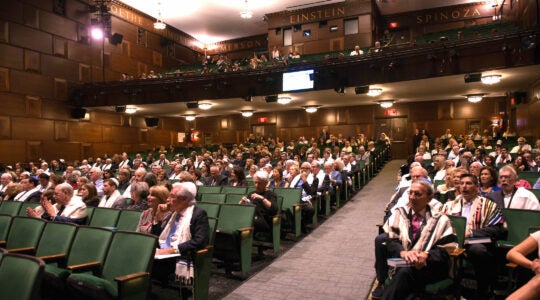When Miriam Langer was waitlisted at one of her preferred medical school programs in the United States, she decided that rather than wait or reapply later, she would opt for an alternative — attend a program in Israel.
“Medical school was the place for me this year, but I still wasn’t willing to apply to sub-par programs,” said Langer, who is now a first-year student at the New York State/American Program at Tel Aviv University’s Sackler Faculty of Medicine. “I had been so resistant to move so far away, but people urged me to look into this as a great option.”
Chartered by the State of New York and accredited by Israel, Sackler’s American program began in 1976 and is taught entirely in English, with approximately 300 students at any given time, according to university data. Sackler is just one of three American medical school programs in Israel, which, as admissions become increasingly competitive, are serving as attractive alternatives for students — Jewish and non — looking to get high-quality educations that lead them to top-caliber American residencies.
In terms of career advancement, “You can get anywhere from there,” Langer said of medical school in Israel. “It’s a much better environment for medical school and you get to be in Israel, which makes it a lot less cutthroat environment.”
The other two programs are Ben-Gurion University of the Negev’s Medical School for International Health, in collaboration with Columbia University’s Medical Center, and the Technion American Medical School at the Ruth and Bruce Rappaport Faculty of Medicine in Haifa.
“Many of [the students] came here because they were not accepted in the U.S.,” said Dr. Arnon Afek, the new director of the Sackler program as of Jan. 1. He is former deputy director of Sheba Medical Center, near Tel Aviv, and a professor of pathology to both American and Israeli Sackler students for years.
His counterpart at the Technion, Dr. Andrew Levy, agreed, adding, “A large percentage — 25 or 30 percent — of students that apply [to U.S. schools] can’t get in, so they’re looking for other opportunities. I think that’s one reason this is increasing. But secondly, it’s recognized that these are well-established universities, and the education is equivalent to what you can receive in the US.”
Some of the students, Afek explained, have gotten into U.S. schools but choose to come here instead – like those who want to strengthen their knowledge of Jewish culture, or those who are simply adventurous.
During their time in Tel Aviv, Sackler students are required to maintain Hebrew proficiency so that they can work in Israeli hospitals during their studies. While most students are Jewish, according to Langer, they typically do not intend to stay in Israel; it is important to her that most alumni “excel in residency in the U.S.”
“I’m not here because I want to make aliyah,” she said.
Afek agreed that most Sacker students don’t end up practicing in Israel, adding, “Don’t forget that the American program is very expensive. Salaries in Israel are not very high for physicians. For so many students, even if they want to make aliyah they can’t afford it. The great majority are physicians who work in the States. It’s very rare that someone makes aliyah.”
But it’s still an advantage, he maintained, for Israel to house these students at its universities. “It’s a way to present our healthcare system to many people,” Afek said. “We look at them as our future ambassadors of good will. They will represent Israel and Israel’s health system to America.”
Dr. Yoseph Mekori, dean of the entire Sackler Faculty of Medicine, feels that having the American students at his school is integral to the future of Israeli medicine; he is not just referring to the advantage that they bring a small income to the school, with tuitions that are higher than those of native Israelis.
“It’s very important for us to get some American standards — they serve as a benchmark for us. We implemented American standards into Israeli programs,” Mekori said. “It’s very important to have these American contacts in the future. They are diplomats — they are ambassadors to Israel as a state and of Israeli medicine.”
Meanwhile, in the south of Israel, Ben-Gurion University’s program has graduated students for 12 years; admissions decisions are conducted by the school’s New York office at Columbia University.
At BGU, the students spend their first three years at the school in the Negev city of Beersheva. They then have an opportunity to do their fourth year of electives in New York or in a series of locations that help them develop their interests in international medicine, explained Dr. Mark Clarfield, Israel director of the Medical School for International Health and professor of geriatrics at BGU.
This year, however, fourth-year students face more limitations, due to a U.S. Department of Education decision to suspend clerkships outside of Israel and America for U.S. citizens who receive government loans. While this still allows some students this year to go to Uganda, Ethiopia and Sri Lanka, Clarfield hopes the ruling will be repealed. For now, students not going overseas can work in Israel’s minority communities, which he calls “pretty exotic places compared to downtown Cleveland.”
While the student body — approximately 42 students per class — is currently about 90 percent American and Canadian, Clarfield says the school and the school community “welcome students from all over the world.” And although they do not ask their students’ religions, he estimates that only about a third are Jewish.
“The school happens to be in Israel, but people don’t come here because it’s Israel,” Clarfield said. “They come here because they are attracted to global medicine.”
One such student, 30-year-old Maya Garala, is in her third year at the program, and specifically chose BGU even though she was accepted at American schools.
“I’m not Jewish, and I have no connections to Israel at all,” she said. “I chose to come here because our school is one of the leaders in the world in global health and international medicine.”
Prior to coming to BGU, she spent time working in the slums of India as well as in Dar es Salaam, Tanzania, dispensing medicine.
“Part of being an effective health care practitioner is understanding your patient and having cultural empathy,” Garala said. “You can learn about the different issues in a classroom in New York, but it’s another thing when you’re getting rockets thrown at you from Gaza. We were here during the war [with Hamas]. For me finding a way to incorporate and sustain myself in a different culture will really sustain the way that I practice medicine.”
Up north in Haifa, the Technion’s American program takes a pretty traditional approach to medical study and attracts mostly Jewish students. When it began in 1983, the school was affiliated with Touro College in New York, but it underwent a reorganization five years ago and became the Technion American Medical School – known locally as “TeAMS.” It is now affiliated with Johns Hopkins University in Baltimore. Admissions have expanded from 10 to 25 per class, and students spend time doing rotations in the U.S. during their fourth year.
“For a lot of the students, especially those who are very tied in with their heritage, but not necessarily their religious heritage, coming to Israel to study medicine is an amazing opportunity,” said Technion’s Levy. “For those who weren’t able to get into schools in the states, they go abroad. When you’re comparing [medical school in Israel] to some of the other opportunities abroad, going to Israel is a no-brainer, especially when compared to the Caribbean.”
Though he has worked at the medical school as a professor of anatomy and cell biology for 13 years – after his aliyah – Levy just took over the TeAMS program on Jan. 2. He admits that since the program is so young, the first graduating class last year didn’t see “impressive” residency matches, but he is optimistic about the future of the school.
“The Touro program did outstanding [with residency matches] with only eight to 10 students a year, but with going up to 25 there have been some growing pains,” Levy said. “Our students are just as good as those at Tel Aviv and Ben-Gurion, and I don’t see why we shouldn’t be able to match as well as they do. That’s my No. 1 priority.”
One advantage of attending medical school at Technion, according to Levy, is the opportunity for research, and even the possibility of pursuing a Ph.D.
“I only applied here in Israel, and of the three schools I chose the Technion because it has more of a research bent,” said Moshe Heshing, 40, who is in his third year and has, unlike the other students, worked in Israel for the past nine years and intends to remain there.
“Ultimately, I want to be here, but it’s a question of where the best residency program is,” he added, noting that it will be difficult to repay his loans if he does in fact stay in Israel.
But no matter where they end up, the students studying in these three medical programs seem to be getting exposure that they could never imagine finding elsewhere.
Garala, who just finished a rotation in the haredi city of B’nei Brak, was floored by her experience there.
“To be living with [the haredim] and in their hospital and learning their way of life is an experience I will cherish forever,” she said. Of her experience with the high birth rates of haredi women, Garala said: “On any given day in the nursery you would see a mom and daughter and grandmother that all had given birth.
“I’m not even sure where to put this on my [residency program] admissions form.”
The New York Jewish Week brings you the stories behind the headlines, keeping you connected to Jewish life in New York. Help sustain the reporting you trust by donating today.




